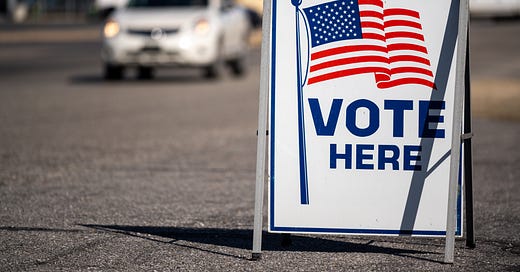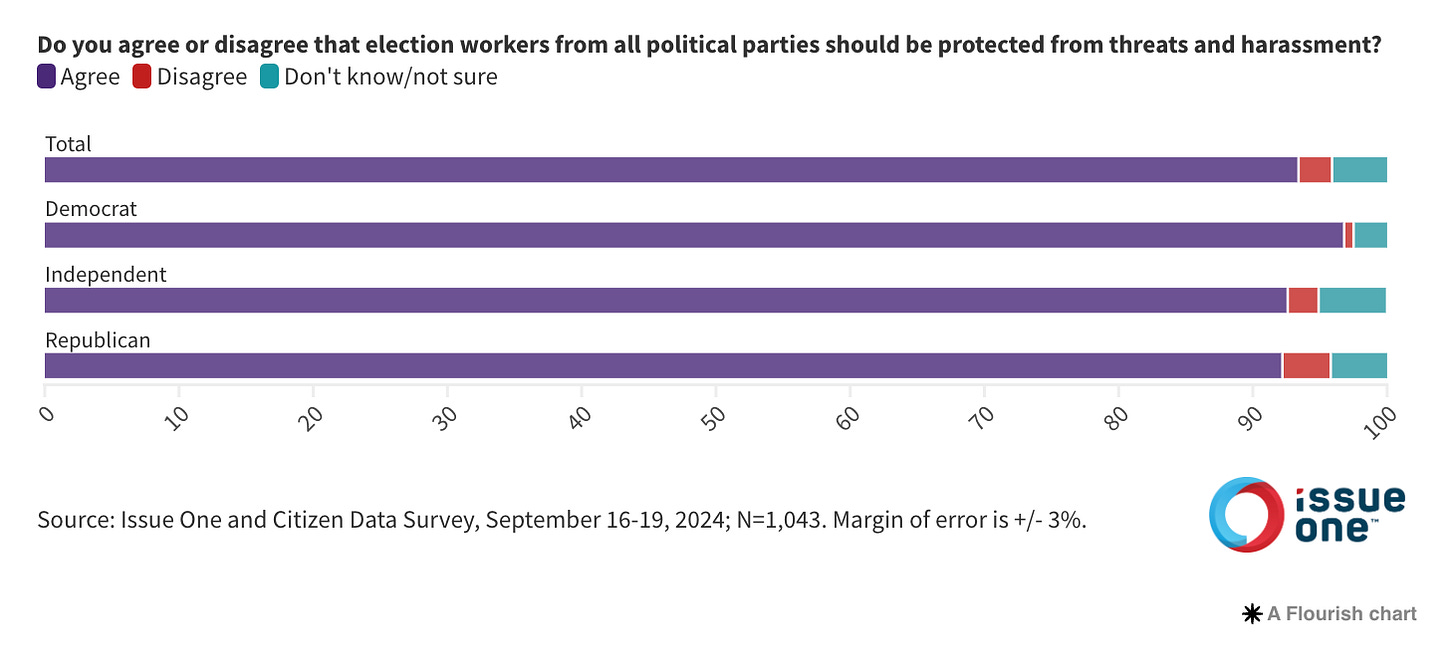Election Workers are at Risk
Since the 2020 election, a campaign has been waged to delegitimize our election process and to undermine longstanding faith in American democracy. As a result of the spread of false information, election officials have been harassed, intimidated, and threatened all because they are committed to doing their jobs – running safe, secure, and fair elections.
Unfortunately, women disproportionately bare the brunt of attacks as they make up nearly 80% of the election workforce across the country. To recognize women election officials’ critical contributions and build support for them as we approach November, Issue One, in partnership with the States United Democracy Center, has launched a campaign to honor and protect women election officials, especially during the heightened post-election period.
According to a Brennan Center survey, since the 2020 election, 92% of local election officials have taken steps to increase election security for voters, election workers, and election infrastructure. That same survey showed that of the nearly 1,000 election officials who responded, 4 in 10 are concerned about being doxxed, and nearly 1 in 4 are concerned about swatting. Some of the most concerning and terrifying threats against election workers have included specific information about their children, homes, cars, and personal phone numbers.
Election Officials are Being Forced to go on the Offensive
Election officials are experiencing a barrage of threats and disruptions. In 2023 leading up to election day, a number of election offices throughout the country – including Georgia, Nevada, California, Oregon, and Washington – were all sent letters laced with fentanyl, containing threats about officials and their family members. Election officials across the country are bracing for threats in myriad ways. Here are just a few examples:
The office of Georgia Secretary of State Brad Raffensperger said it would provide naloxone to any of the state’s 159 counties after a letter was intercepted on its way to election officials in Atlanta’s Fulton County tested positive for opioids.
Arizona Secretary of State Adrian Fontes and his office have coordinated active-shooter drills for election workers and have sent kits to county election offices that include tourniquets to stem bleeding, devices to barricade doors, and hammers to break glass windows.
In Michigan, local election workers have been trained on how to de-escalate hostile situations, and state officials are setting up a texting program so workers can quickly contact their bosses and law enforcement if they are in danger — a measure already implemented in Georgia.
In Maricopa County, Arizona — a hotbed of election misinformation and conspiracy theories since 2020 — the tabulation center now sits behind a chain-link fence, behind black iron gates, and with guards who block the entrance that requires a security badge to access. The glass surrounding it is shatterproof.
Durham County, North Carolina, has a new office with significant upgrades for this year’s election. A main feature of their new office – beyond the security cameras, panic buttons, and badge access doors – is the mail processing room which contains a separate exhaust system to contain potentially hazardous substances sent in the mail.
In Cobb County, Georgia local sheriff’s deputies are stationed at all early voting locations, and poll managers are equipped with panic buttons that are attached to a special 911 dispatcher set up solely to take their calls.
Current State Legislation
This problem isn’t a localized issue, but rather a countrywide one. Since 2020, state and local public officials across the country have endured doxxing, armed protests at their homes, personal and online threats, vandalism, and physical violence. The exposed information typically includes home addresses, phone numbers, and family details, putting not just the officials but also their loved ones at risk as well. In response, 20 states have enacted laws specifically addressing protections for election officials and poll workers.
In Arizona, multiple election workers in Maricopa County experienced doxxing online, leading to their families being forced to evacuate their homes, be brought to a safe house, and issued security details. In 2023, Arizona passed a law that allows election workers to have their personal information removed from public records if they believe their life or safety is in danger. Additionally, in early 2024, a bill was introduced in the state senate, SB 1517, that would make doxxing election workers illegal.
In Colorado – where one county clerk kept her pregnancy hidden from the public out of fear of attacks against her and her unborn child – the Colorado governor signed into law HB 22-1273, which prohibits a person from making the personal information of an election official or an election official’s immediate family publicly available on the internet. It also includes a confidentiality program to help election officials remove their personal information from public databases.
In another instance, a county clerk in Nevada had increased security at her home and office after a conspiracy-laced rant was written on a piece of election literature that included a threat to “crush” her skull. In 2023, Nevada’s governor signed into law the Election Worker Protection Bill (SB 406) that makes it a felony to harass, threaten, or dox an election worker.
Passing legislation like the ones mentioned is an essential step in protecting the people who administer our elections and make our democracy work. After Nevada passed SB 406, the Clark County registrar of voters said it was “a big sigh of relief” for all the workers in the county’s election office. Nevada’s 2024 presidential primary was the first federal election since February 2020 when there weren’t death threats towards Clark County election officials.
Legislation protecting the sensitive, personal information of election officials has widespread bipartisan support. According to an Issue One survey conducted last month, 93.4% of Americans agree that election workers from all parties should be protected from threats and harassment. Furthermore, an Issue One poll from last year found that 77% of Americans believe sensitive information, such as home addresses and license plate numbers, should be protected from public disclosure, with broad support for anti doxxing legislation among Democrats (77%), Republicans (76%), and independents (77%) alike.
Federal protections are urgently needed in order to combat the growing threat against election officials. Current federal law does not extend doxxing protections to election officials. Such legislation should criminalize doxxing, establish a process for removing personal information from public databases and websites, and increase funding support for state and local agencies to implement protective measures.
Our election workers uphold the legacy of free and fair elections with unwavering dedication in the face of immense public pressure, scrutiny, and violence. Our elections in this country are safe and secure because of the tireless and dedicated work of election officials. We owe them the same level of security that they work to provide for us.





